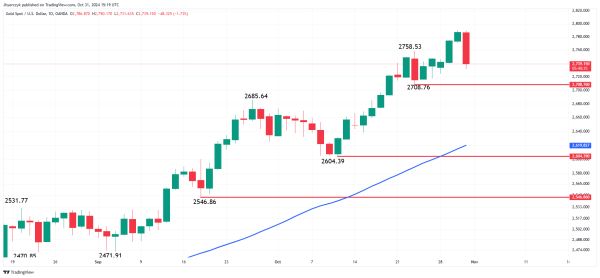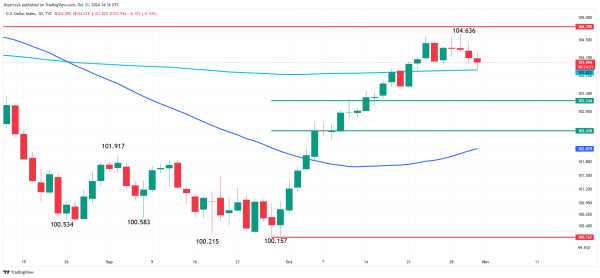US Dollar Index Analysis: Gold Drops $50 as Jobs Report and Fed Rate Cut Uncertainty Loom
U.S. Dollar Index Edges Lower as Traders Await Key Economic Indicators
The U.S. Dollar Index (DXY) traded lower on Friday despite a reported uptick in September’s U.S. personal consumption expenditures (PCE) inflation, which matched expectations.
Treasury yields rose in tandem with inflation but had limited impact on the dollar’s direction as traders focused on Friday’s pivotal U.S. Non-Farm Payrolls report.
The dollar’s slip surprisingly influenced bearish reactions in commodities, particularly gold and silver, as markets prepare for a packed week of economic updates, including the Federal Reserve meeting and the U.S. presidential election.
PCE Inflation Maintains Fed’s Rate Cut Trajectory
The Commerce Department’s September PCE report, closely monitored by the Fed, reflected a 0.2% rise in prices, aligning with forecasts. Year-over-year, the PCE index climbed by 2.1%, the smallest annual increase since early 2021. Excluding food and energy, core PCE rose 0.3% for the month, marking a 2.7% annual increase, underscoring the Fed’s ongoing target of 2% inflation.
Analysts largely anticipate the Fed will proceed with a 25-basis-point rate cut in its upcoming meeting, following the September initiation of its policy easing cycle with a substantial half-percentage-point reduction.
Market Commentary on Inflationary Pressures and Fed Policy
Despite core PCE inflation ticking up slightly, some analysts are voicing caution over a potential re-acceleration of inflation. Michael Landsberg, CIO of Landsberg Bennett Private Wealth Management, anticipates a gradual inflation increase into late 2024 and believes the Fed may implement its expected rate cut in November but pause in December if inflation persists.
Similarly, Peter Cardillo, Chief Market Economist at Spartan Capital Securities, noted that elevated core inflation might encourage the Fed to pause rate cuts, especially as consumer spending remains robust.
“Consumption remains strong,” Cardillo said, adding that third-quarter GDP data showed resilient consumer spending, reinforcing inflation concerns.
Gold Gains on Safe-Haven Demand as Election Looms

Gold prices experienced consolidation and weakness on Thursday after recent gains, as traders positioned ahead of high-stakes events next week, including the U.S. election and Fed meeting. Gold, often a hedge during geopolitical instability, is likely to remain in “buy-on-dips” mode, according to StoneX analyst Rhona O’Connell. At 15:16 GMT, XAU/USD is trading $50 lower or about 1.77%.
With polls showing a close presidential race between former President Donald Trump and Vice President Kamala Harris, and inflation uncertainty looming, gold’s safe-haven appeal remains intact.
Jobs Report Anticipated as a Key Fed Policy Indicator
With Friday’s Non-Farm Payrolls report in view, analysts expect hiring to show resilience despite potential disruptions from recent strikes and natural disasters. Weekly jobless claims data came in below expectations, supporting a strong labor market narrative.
Christopher Rupkey, Chief Economist at FWDBONDS, noted that companies seem confident in economic stability, with limited layoff activity suggesting minimal impact from recent challenges.
Market Forecast

In the near term, the dollar’s direction will hinge on its response to the 200-day moving average at 103.822, which serves as a technical pivot. A break above 104.799 could support a bullish shift, while a decline toward 103.144 would signal further downside.
If the upcoming jobs data supports continued strength in the labor market, the Fed may find additional justification for a rate pause. This, coupled with election uncertainties, could lead to increased dollar volatility in the week ahead, potentially benefiting non-yielding assets like gold.